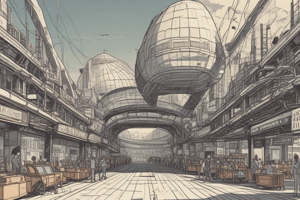Podcast
Questions and Answers
What is a characteristic of perfect competition in terms of the number of buyers and sellers?
What is a characteristic of perfect competition in terms of the number of buyers and sellers?
- One buyer and many sellers
- Many buyers and sellers, but each has a significant influence on the market
- A few buyers and many sellers
- Many buyers and sellers, but each has a tiny fraction of the total market output (correct)
What is the primary reason why a single supplier cannot influence the market price in a perfectly competitive market?
What is the primary reason why a single supplier cannot influence the market price in a perfectly competitive market?
- Because the supplier produces a unique product
- Because the supplier has limited access to technology
- Because the supplier is a small player in the market
- Because the supplier is a tiny fraction of the total market output (correct)
What is a characteristic of the product offered in a perfectly competitive market?
What is a characteristic of the product offered in a perfectly competitive market?
- A unique product that distinguishes one supplier from another
- A product with a high price elasticity
- A standardized product that is identical across suppliers (correct)
- A differentiated product that appeals to a specific niche
What is a requirement for entry and exit in a perfectly competitive market?
What is a requirement for entry and exit in a perfectly competitive market?
What is an example of a perfectly competitive market?
What is an example of a perfectly competitive market?
Why do buyers not pay more for one particular supplier's product in a perfectly competitive market?
Why do buyers not pay more for one particular supplier's product in a perfectly competitive market?
What is a characteristic of a perfect competition?
What is a characteristic of a perfect competition?
What is the term for the ability of a firm to raise its price without losing all its sales to rivals?
What is the term for the ability of a firm to raise its price without losing all its sales to rivals?
What type of entry barrier is represented by a government granting a company exclusive rights to supply a product?
What type of entry barrier is represented by a government granting a company exclusive rights to supply a product?
What is the result of economies of scale in a company?
What is the result of economies of scale in a company?
What is the opposite of perfect competition in terms of market structure?
What is the opposite of perfect competition in terms of market structure?
What prevents new firms from entering a monopolized market?
What prevents new firms from entering a monopolized market?
Flashcards are hidden until you start studying
Study Notes
Market Structures
- Market structures can be classified into four types: Perfect Competition, Monopoly, Monopolistic Competition, and Oligopoly.
Perfect Competition
- Features:
- Many buyers and sellers, with each individual buying or selling a tiny fraction of the total market output.
- Standardized products, identical across suppliers.
- Buyers are fully informed about price, quality, and availability of products.
- Sellers are fully informed about availability of resources and technology.
- Firms can easily enter or leave the industry with no obstacles.
- Examples:
- Coconut market, where individual suppliers are a tiny fraction of the market output.
- Philippine exports of coconut products to the United States.
Characteristics of Perfect Competition
- Many buyers and sellers in the market.
- Each company makes a similar product, with identical products.
- Buyers and sellers have access to perfect information about price.
- There are no transaction costs.
- There are no barriers to entry into or exit from the market.
Monopoly
- Definition: A sole supplier of a product with no close substitutes.
- Origin: Greek word meaning "one seller."
- Characteristics:
- Monopolist has more market power than a business in another market structure.
- Market power: ability to raise price without losing sales to rivals.
- No market power in perfect competition.
Barriers to Entry in Monopoly
- Three types of entry barriers:
- Legal restrictions: government restrictions on entry, such as patents, licenses, and exclusive rights.
- Economies of scale: cost advantages of large-scale production.
- Control of an essential resource: exclusive access to a resource necessary for production.
Examples of Barriers to Entry
- Legal restrictions: government-granted monopoly rights to collect garbage, offer bus and taxi services, and supply other services.
- Economies of scale: car manufacturing, where large-scale production reduces costs per unit.
- Control of an essential resource: exclusive access to a resource necessary for production.
Studying That Suits You
Use AI to generate personalized quizzes and flashcards to suit your learning preferences.




